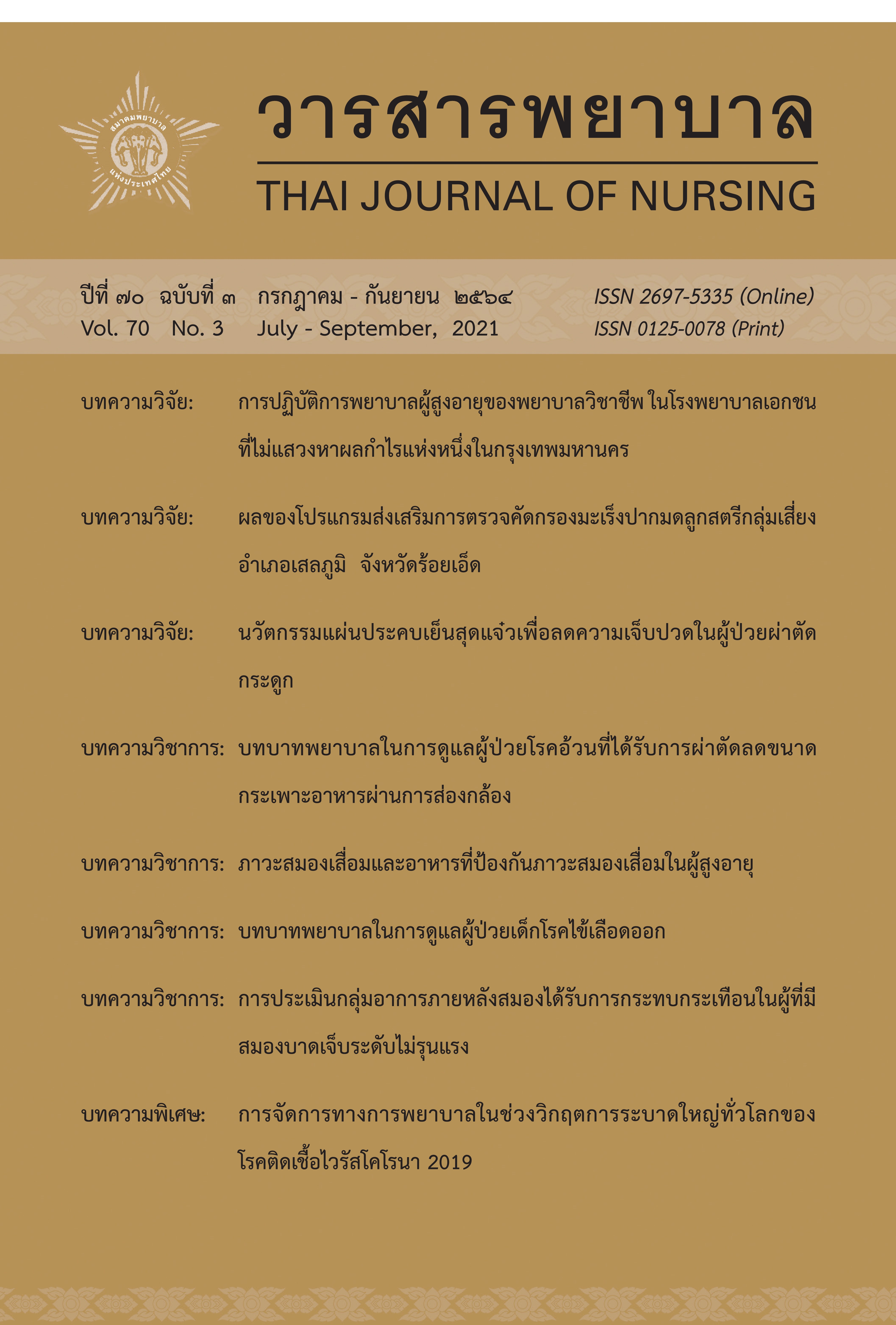Assessment of post-concussion syndrome in person with mild traumatic brain injury
Main Article Content
Abstract
The patients with mild traumatic brain injury (mTBI) are the vast majority of patients admitted in hospital. They usually have no severe symptoms and can be recovered over weeks or months after injury. Some unrecovered patients with mTBI develop post-concussion symptoms and have to readmit in hospital. Currently, there are two instruments widely used for assessing the patients with mTBI.1) The Rivermead Post-Concussion Symptom Questionnaire (RPQ) which is used to assess the severity of post-concussive symptoms including 16 signs and symptoms at two weeks, one month, three months, six months and one year. 2) The Rivermead Head Injury Follow Up Questionnaire (RHFUQ) which is used to assess the experience of mTBI patients who have functional and social outcomes following traumatic brain injury as well as to compare pre and post injury symptoms. They should be assessed immediately, at three and six months after injury due to a prolonged occurrence of post-concussive symptoms. If nurses and other health care professionals can evaluate the symptoms and provide treatment immediately, it will result in patients returning to work, having a good quality of life, and reducing the cost of treatment.
Article Details
References
นครชัย เผื่อนปฐม, และธีรเดช ศรีกิจวิไลกุล. (บ.ก.). (2562). แนวทางเวชปฏิบัติกรณีสมองบาดเจ็บ(Clinical
practice guidelines for traumatic brain injury) . กรุงเทพมหานคร: พรอสเพอรัสพลัส.
สถาบันการแพทย์ฉุกเฉินแห่งชาติ. (2563). รายงานสถิติการแพทย์ฉุกเฉิน. สืบค้นเมื่อ 1 เมษายน 2563, จาก
http://ws.niems.go.th/ITEMS_DWH/
อริยาวรรณ วรรณสีทอง, นิภาวรรณ สามารถกิจ, และเขมารดี มาสิงบุญ. (2559). ความสัมพันธ์ระหว่าง
อาการปวดศีรษะ อาการอ่อนล้า และความแปรปรวนของการนอนหลับกับความสามารถในการปฏิบัติ
กิจกรรมของผู้ป่วยบาดเจ็บที่ศีรษะระดับเล็กน้อย. วารสารการพยาบาลและการดูแลสุขภาพ, 34(2),
-163.
อินทิรา ทาเอื้อ, เกศรินทร์ อุทริยประสิทธิ์, ปรางทิพย์ ฉายพุทธ, และบรรพต สิทธินามสุวรรณ. (2553).
ความสัมพันธระหว่างกลุ่มอาการภายหลังสมองได้รับการกระทบกระเทือนกับภาวการณ์ทำหน้าที่ใน
ผู้บาดเจ็บศีรษะเล็กน้อย. วารสารสภาการพยาบาล, 25(2), 39-53.
Chakroun-Walha, O., Rejeb, I., Boujelben, M., Chtara, K., Mtibaa, A., Ksibi, H., . . . Rekik, N.
(2017). Post-concussive syndrome after mild head trauma: Epidemiological features in Tunisia.
European Journal of Trauma & Emergency Surgery, 43(6), 747-753. doi:10.1007/s00068-016-
-7
Crawford, S., Wenden, F. J., & Wade, D. T. (1996). The Rivermead head injury follow up
questionnaire: A study of a new rating scale and other measures to evaluate outcome after head
injury. Journal of Neurology, Neurosurgery, and Psychiatry, 60(5), 510-514.
doi:10.1136/jnnp.60.5.510
Daneshvar, D. H., Riley, D. O., Nowinski, C. J., McKee, A. C., Stern, R. A., & Cantu, R. C. (2011).
Long-term consequences: Effects on normal development profile after concussion. Physical
Medicine and Rehabilitation Clinics of North America, 22(4), 683-700, ix.
doi:10.1016/j.pmr.2011.08.009
Faul, M., Xu, L., Wald, M. M., & Coronado, V. G. (Eds.). (2010). Traumatic brain injury in the United
States: Emergency department visits, hospitalizations, and deaths, 2002-2006. Atlanta GA:
National Center for Injury Prevention and Control and Centers for Disease Control and Prevention.
Hickey, J. V. (2014). The clinical practice of neurological and neurosurgical nursing (7th.ed.).
Philadelphia: Wolters Kluwer/Lippincott Williams & Wilkins.
Kasch, H., & Jensen, L. L. (2019). Minor head Injury symptoms and recovery from Whiplash injury: A
-year prospective study. Rehabilitation Process and Outcome, 8, 1-6.
doi:10.1177/1179572719845634
Katz, D. I., Cohen, S. I., & Alexander, M. P. (2015). Chapter 9 - Mild traumatic brain injury. In J.
Grafman & A. M. Salazar. (Eds.). Handbook of Clinical Neurology Volume 127 (pp. 131-156).
Boston: Elsevier.
King, N. S., Crawford, S., Wenden, F. J., Moss, N. E., & Wade, D. T. (1995). The Rivermead Post
Concussion Symptoms Questionnaire: A measure of symptoms commonly experienced after head
injury and its reliability. Journal of Neurology, 242(9), 587-592. doi:10.1007/bf00868811
Marshall, S., Bayley, M., McCullagh, S., Velikonja, D., & Berrigan, L. (2012). Clinical practice
guidelines for mild traumatic brain injury and persistent symptoms. Canadian Family Physician,
(3), 257-267.
Nardi, J. (2020). Increasing brain derived neurotrophic factor with traumatic brain injuries. Nutritional
Perspectives: Journal of the Council on Nutrition, 43(2), 20-21.
Plass, A. M., Praag, D. V., Covic, A., Gorbunova, A., Real, R., Steinbuechel, N. V, & Dutch and
Flemish CENTER TBI investigators (2019). The psychometric validation of the Dutch version of
the Rivermead Post-Concussion Symptoms Questionnaire (RPQ) after traumatic brain injury (TBI).
PLOS ONE, 14(10), e0210138-e0210138. doi:10.1371/journal.pone.0210138
Potter, S., Leigh, E., Wade, D., & Fleminger, S. (2006). The Rivermead Post Concussion Symptoms
Questionnaire: A confirmatory factor analysis. Journal of Neurology, 253(12), 1603-1614.
doi:10.1007/s00415-006-0275-z
Zollman, F. S. (Ed.). (2016). Manual of traumatic brain injury: Assessment and management (2nd.ed.).
New York: demosMedical.


